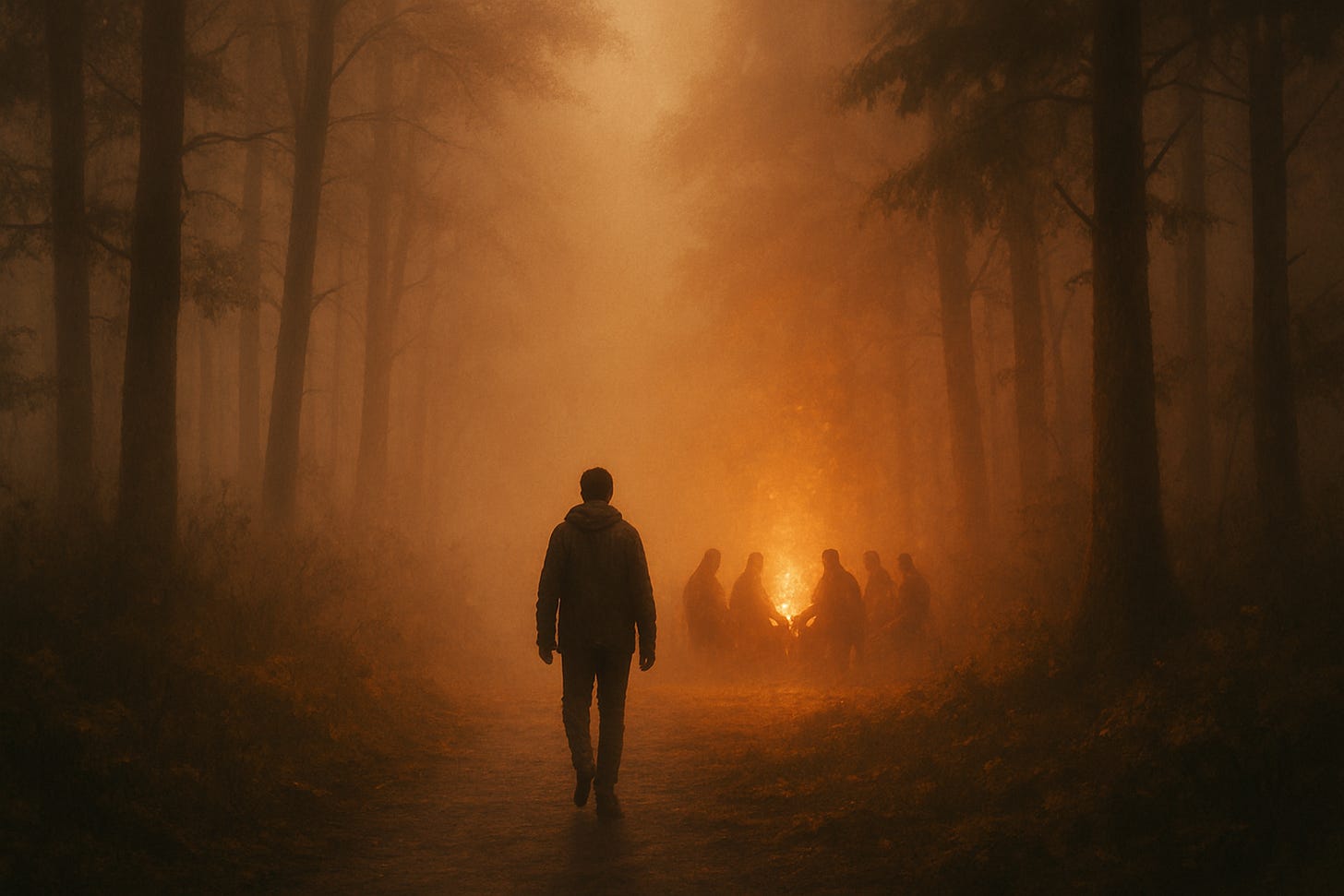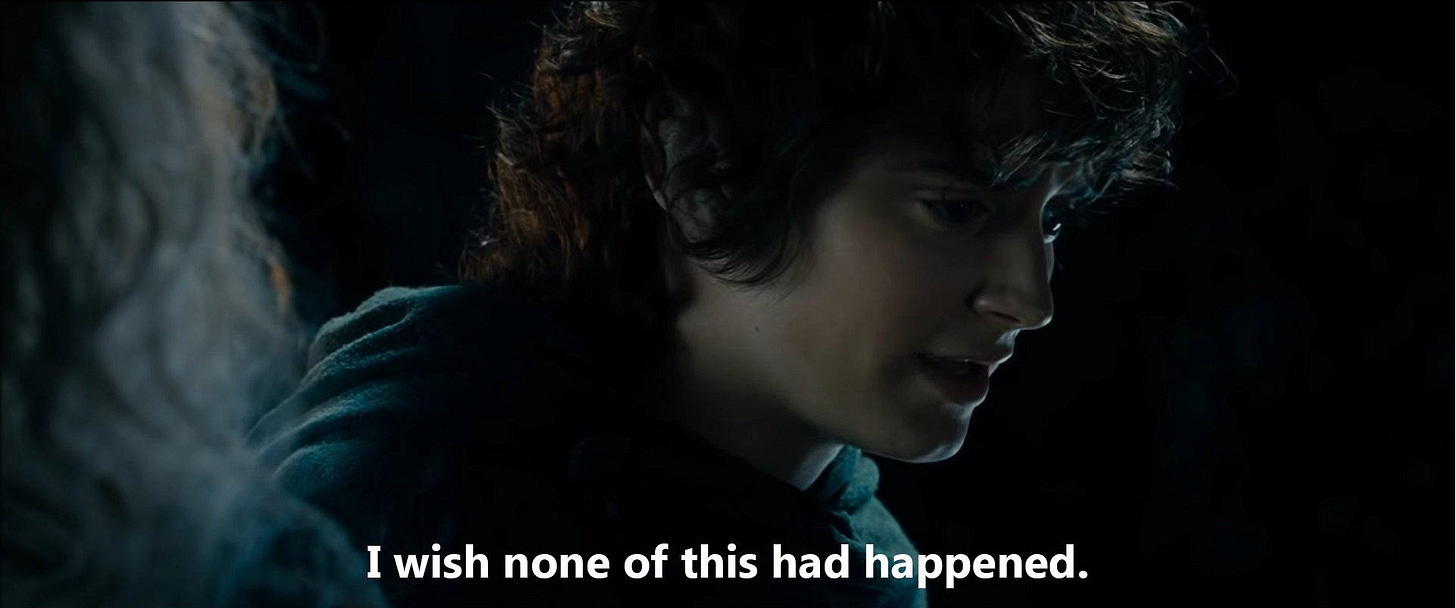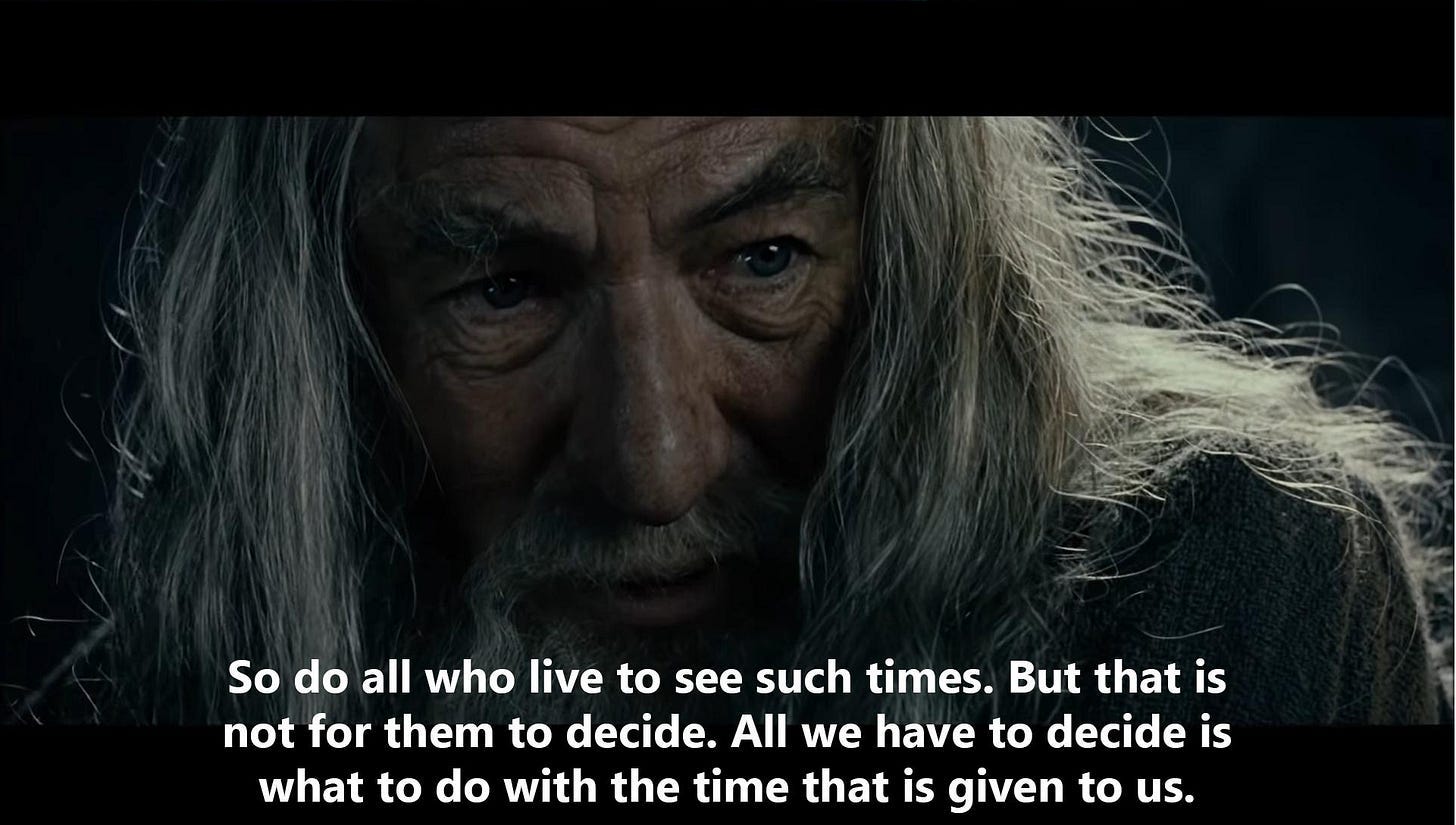How to Respond When the World Unravels
Grief, hope and the communities quietly building what comes next
I have been to a place outside of time.
An oasis of peace and beauty. A wayhouse for misfits.
For seekers, for dreamers, for the tormented.
I have seen a glimpse of a world beyond this place of wrath and tears1
The future is already being built, even as this old world dies.
There are forces at work, just beyond your gaze.
Step through the veil. Go on the journey.
The others you are searching for are present and more numerous than you imagine.
You are not alone in this longing.
The place you dream of exists.
The world you long for can be built.
You are not alone. You are not alone.
I wrote those words after returning from a systems change/Metacrisis retreat in the Rocky Mountains of Canada. The retreat was made possible thanks to a generous fellowship from the Wolf Willow Institute. Over five quiet days, we gathered to reflect, grieve, and answer one question: How do we respond to the unraveling of our world?
What I experienced there gave shape and voice to something I had already been carrying for a long time.
Like many people, I’ve felt a quiet, persistent grief—a heaviness that’s hard to name but impossible to ignore. It’s the weight of watching our world fray at the seams. Of sensing, somewhere deep down, that something is unraveling—not just out there in the news or the climate, but in how we live, relate, and hope. Some days, the despair sits heavy. Some days, the fog feels endless.
If you haven’t come across the term before, Metacrisis is the idea that the many challenges we face today—climate change, AI risk, biodiversity loss, inequality, mental health collapse, institutional failure—aren’t separate issues. They’re threads in the same tangled knot—a deeper, systemic failure of how we organize life and meaning. I have written about it extensively here.
It’s a failure of our economic incentives, our governance structures, our cultural narratives, and even our inner lives. We’ve built a civilization optimized for short-term extraction, individual status, and control—and we’re now running into the limits of that model.
Addressing the Metacrisis isn’t about solving one problem at a time. It means recognizing the common roots: disconnection from each other and the natural world, linear thinking, scarcity-driven competition, and systems that reward harm over care. It’s about changing the whole story—from the inside out.
That can seem like a tall order on the best of days. But something shifted for me during the retreat.
During our time there, we walked in nature, shared stories, meals, and moments of stillness. We took part in deceptively simple exercises that brought us face to face with our limitations. We listened to songs and poems and participated in ceremonies.
But as Carl Jung would say, that is but the description of things and doesn’t really get to the heart of the matter at all.
What moved me most wasn’t a big solution or anything we did, but something much quieter: the sincerity and beauty of people who were trying. Each person was carrying something—grief, uncertainty, urgency—and still showing up. Still listening. Still choosing to stay awake. It reminded me that the Metacrisis isn’t just a systems problem. It’s a human one. And what we can collectively break, we can collectively remake.
The retreat was especially powerful coming right after Limicon, a month-long remote conference with a similar focus. It was a unique concept, a co-created conference—where participants themselves were free to create/host any session they felt the desire to. I couldn’t help but wonder at how people came together to build something new. There were no experts handing down wisdom. Just ordinary people picking up the parts of the puzzle they felt called to and getting to work.
Through connections I made in the conference, the retreat, and elsewhere, I’ve seen human ingenuity being unleashed across every domain—politics, economics, energy, environment, education, storytelling, governance, and more. I met people reimagining democracy and governance systems, restoring our biosphere, and experimenting with new economic models that prioritize well-being over profit. Outside the gaze of mainstream media, millions of people have woken up to the challenge of our times.
They feel the fear of these times, but their sense of meaning is greater than their fear2. So they are marching forward—sometimes solemnly, sometimes haltingly, sometimes fiercely, sometimes joyously— feeling it all, meeting this moment in all their aliveness and fullness.
Taken individually, these efforts might seem scattered. But together, they felt like early signals of something larger—not a counterculture, but the beating heart of a new world that is being born. It is a glimpse of how things might be done differently—not through force or ideology, but through connection, humility, and care.
“Another world is not only possible, she is on her way. On a quiet day, I can hear her breathing.”
—Arundhati Roy
If you’ve been feeling some version of what I’ve described—heaviness, confusion, a longing for something more sane—I want to offer this: you’re not alone. And you don’t need to figure it all out by yourself.
There’s no single map for navigating the Metacrisis, but there are people already walking the terrain. They’re building communities, testing new models, asking better questions, and—most importantly—supporting each other as they go.
If you’re looking for a place to begin, I am going to link to some communities that might be worth joining at the end of this post. After all, as my wise friend Maryam pointed out during the retreat, “We have critical mass, we just lack critical connection”.
That said, these communities can feel disorienting at first—like being dropped into a ‘choose your own adventure’ game with no map. The language differs. The entry points are many. One person might talk about “polycrisis,” another “degrowth,” another “doughnut economics.” Multiple names for the same effort to build a better world.
What helped me most in navigating this confusion was just talking to people. Asking questions. Following threads. These aren’t closed circles; they’re full of kind, curious, welcoming people doing their best. If you have five honest conversations, I suspect you’ll begin to find your way.
If you’re not ready to talk to people yet, that’s okay too. Thinkers like Nate Hagens and Daniel Schmachtenberger have publicly available talks that can offer solid starting points. And if all of this still feels like too much, feel free to reach out to me. I would be happy to point you toward something that fits.
When I started this newsletter a few months ago, I hoped that through it, I would connect with like-hearted folks3 and maybe we could figure out a way through our myriad crises together. The communities and people I have encountered represent the fulfillment of that hope.
Riddled with uncertainty as I have been while walking this path, that fulfilment has made me realize the wisdom of something my father says often—
”Many of the problems in life are like a fog. They seem impenetrable, but when you walk forward, they offer no resistance.”
That means we don’t need to see the whole path. Just the next step.
We live in a time between worlds (h/t Zak Stein). In that period in history where we wait with collectively held breaths to see what will become of us. Many of us wish we never had to face these days. Our situation reminds me of Frodo in The Lord of the Rings, tasked as he was with an impossible burden.
Luckily, Gandalf had far better counsel for Frodo than I could ever offer.
Those lines stay with me. Because these times will challenge us. They’ll stretch us in ways we never asked for. They’ll be uncomfortable, disorienting, and sometimes scary as hell.
But they’ll also be meaningful. Tender. Full of unexpected beauty. If we let them, they’ll make us grow into something more whole.
Once we let go of our need for certainty—once we accept that the old ways are crumbling—we’re free to reimagine everything.
As much as I wish the world were not in crisis, I also can’t imagine a more worthwhile way to spend our brief time here: working with others to bring forth a future more brilliant than any of us could dream of alone.
What a time to be alive.
If you’re looking to connect, here are a few communities that take a systems lens to the Metacrisis:
These aren’t the only ones, of course. If your passion lies in a specific area—like mental health or climate change—there are thousands more groups doing meaningful work. A quick search on Google or ChatGPT will take you far.
If you find this post useful, please consider a small contribution to keep this inquiry going
This phrase is, of course, borrowed from William Ernest Henley’s Invictus
This framing was shared by one of the participants of the retreat. Alas, I forget who
Thanks to Jochen Weber who I met at Limicon for this framing instead of like-minded







The first step to solving a problem is to admit that we have one. It's a brutally honest admission that we have many. From this critical mass only a solution would evolve. It is not that such crisis or a meta crisis is unfolding. It has been happening in every era and as Lord Krishna himself has announced in The Geeta, "yada yada hi dharmasya glanir bhavati bharatah, abhyuthanam adharmasya, tadatman srijayaham, paritranaya ch sadhu am, vinashay ch dushkritam, dharm sansthapanay, sambhavami yuge yuge"
Put simply the Lord proclaims that in every age he incarnates to restore the Dharma and end the evil.
When we join hands and minds, we become a master mind and then that master mind becomes the harbinger of change. Your essay is a reaffirmatuon of faith that all is not lost.
One of my favourite things I've read in a while. We are coming together like imaginal cells in a caterpillar to form a butterfly. Only most of the world doesn't see it. How pleasantly surprised they're going to be and what a time to be alive indeed!